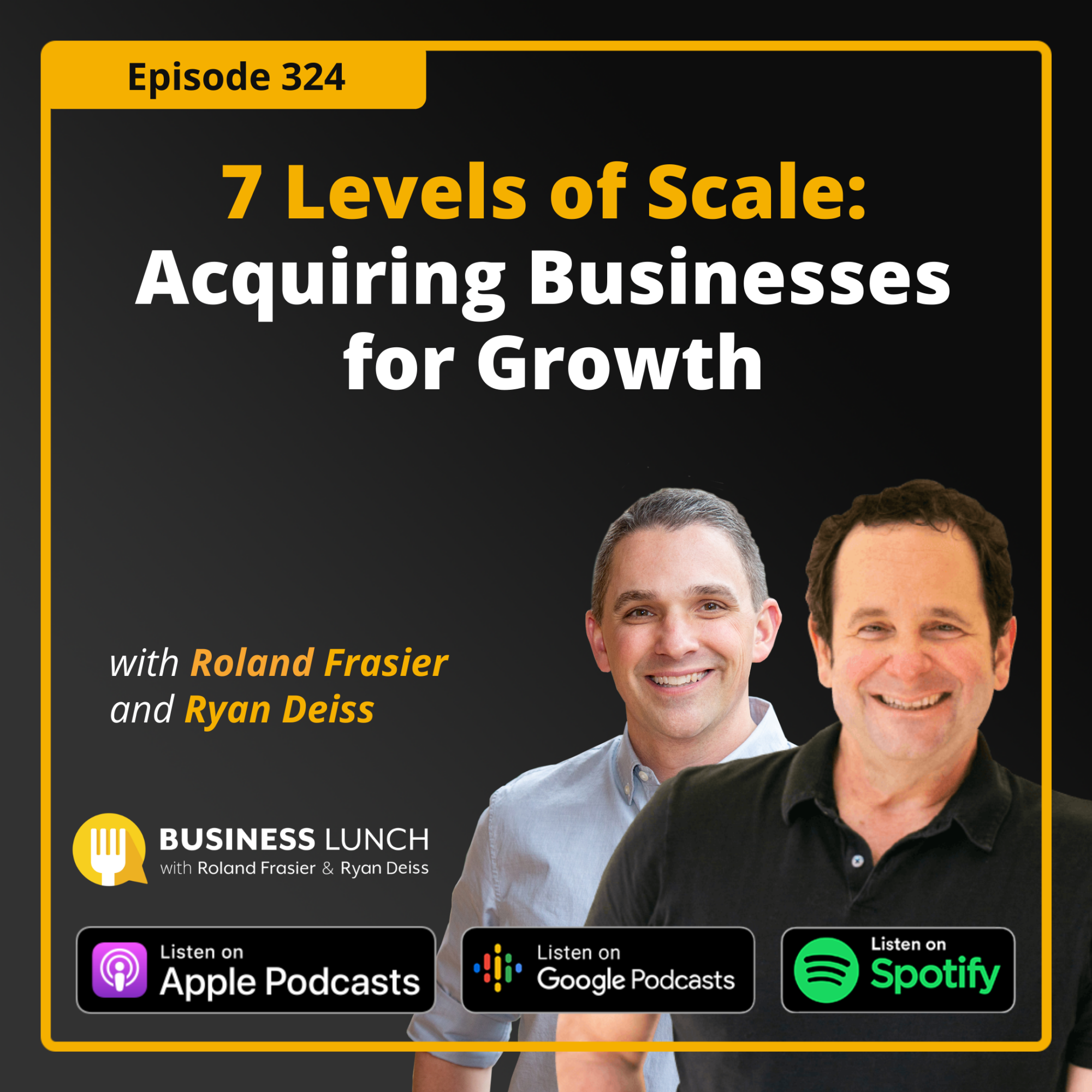When it comes to growing and scaling your business, the 7 Levels of Scale give you everything you need to know and do—and in the exact order you need to do it.
In previous episodes, co-hosts Roland Frasier and Ryan Deiss have walked through levels 1-5 of their proven and powerful framework, The 7 Levels of Scale. In today’s episode, they’re discussing Level 6, Complete an Acquisition for Expansion. This level is one of Roland’s favorites. He’s acquired over 1000 businesses over the course of his career and has been in the trenches of acquisition more than anyone else Ryan has ever met.
Before you listen, make sure you’re all caught up on Levels 1-5. Here are all 7 in their very important, non-negotiable order:
- Level #1: Sell and serve 10 customers.
- Level #2: Build a growth flywheel.
- Level #3: Build an upgraded scalable operating system.
- Level #4: Double your take-home pay.
- Level #5: Build your advisory board.
- Level #6: Complete an acquisition for expansion.
- Level #7: Hit your number.
Once you’re caught up, listen in for everything you need to know about Completing an Acquisition for Expansion.
The Data Supports Acquisition for Growth
If this idea of acquiring businesses and assets is something that interests you, Roland has done multiple podcast episodes on the topic. He’s up to 220 ways to acquire a business. There’s no limit, and he’s constantly adding to the list. Every other month, he runs a 5-day EPIC challenge helping people acquire businesses.
Clients often ask Roland and Ryan: I could see acquiring a business to get into business, but why is it a level in this 7 levels of scale? Why is acquisition of another business a critical step to scaling a business you already have?
Roland is quick to tell them that it’s not just his belief. The data supports it. Mergers and acquisitions have been proven to be one of the fastest ways to grow a company consistently. They absolutely need to be a part of your growth strategy. It makes sense. If you want to double the size of your business literally overnight, the simplest thing to do is acquire another business of the same size.
Practical Reasons to Acquire a Business
Why do people want to grow their business? Some might say: I want to grow to achieve my goals. Okay, what can help you make that happen? Most of us know about a horizontal acquisition, acquiring our competitors. If you acquire a competitor, you’ve decreased your competition and increased your market share. It could be a replacement product or substitute or the same product but to a different audience.
Maybe you want to acquire to solve a challenge you face, which is currently constraining your growth. A common one is: I need more customers, so I need more leads. You could buy the customers directly by buying the competitor, or you could acquire the media that already exists, where somebody has already aggregated the eyeballs of your ideal client.
Ryan asks a great question: Why would we, who own DigitalMarketer, need to acquire media? Because everyone needs more leads, and it’s only smart to get them for the best deal possible. DM looks everywhere for leads—across channels and platforms, organic vs. paid. One of the richest veins of customers is finding someone who’s already gathered your avatar. You can often acquire that media for less money than it would take to get all of those people individually through advertising. That’s a great deal.
Let’s say it costs $10 to acquire a customer. If you want 1000 customers, that’s $10k. What if you found a group with 50k or 200k members and acquired it for less money? DigitalMarketer once acquired a group of 250k members for $1500. That’s an amazing deal.
More Ways to Acquire Media
With all the privacy changes that are happening with Facebook and Apple, advertising options are going away. Apple is literally saying they’ll put a fake email in there for you so people can’t capture your data. As all the rules get tighter, if you can get a bunch of customers by acquiring media—a Facebook group, a YouTube channel, a podcast—then that’s a really smart thing to do. They’ve already aggregated your perfect customers.
One of Roland’s companies sells products to dog owners, and they’ve bought 12 Facebook groups for various dog breed owners/lovers. One of those groups is generating about 100 sales a day. Plus they’re building rapport and relationships with these people, and they can offer these groups access to other people they do business with.
Roland’s real estate business acquired the second largest real estate agent group online. That added 50k real estate agents to their network. They’ve since grown the group to close to 100k. That’s a fantastic way to get leads. They do this very regularly.
It’s always better to own the media yourself. You’ll be better connected and see a higher conversion rate than just advertising on another channel. You’re acquiring media in a world where it’s getting more difficult and expensive to advertise. Business Lunch is in the process of reducing advertising slots. They built this themselves and they want a better experience for their listeners with less ad clutter. More and more creators are determining that they should have some sort of ownership in what they’re promoting. The more media you own directly, the better.
Historically speaking, if you wanted attention, you had to buy it or earn it. You had to buy advertising or do some kind of PR to earn it. All of those channels are getting more expensive, more complicated, and more crowded. A faster, more economical, play, in a lot of cases, is to acquire that media. Roland and Ryan have been saying this for years, and people are finally paying attention.
Other Reasons to Acquire Businesses
There are so many reasons to pursue acquisition. You can look to acquire to increase market share. You can look to acquire to increase media exposure/awareness to get more leads/sales. You can look to acquire for infrastructure. Maybe you’ve got a business that’s growing, but you can’t find the teams/talent fast enough to support it. That’s a great and scary problem to have. You don’t want the wheels to fall off your business.
There’s a whole concept called acqui-hiring where you go out and acquire assets or divisions or entire companies simply to acquire their talent. As we go through the Great Resignation, it’s going to be harder and harder for us to retain the great talent we want. If we can find teams already established, that’s better. You could do this with a software development team, a sales team, a marketing team.
What Kind of Investment Is Required?
Traditionally, acquiring a business would require you to come up with 20% to 40% down. If it’s a million dollar business, you’ll need $200k to $400k down, then financing with personal guarantees. But there are a lot of creative deals you can do instead. At EPIC, Roland teaches people how to acquire businesses with no money out of pocket.
It’s about identifying categories of businesses you want to acquire, identifying specific candidates, reaching out and contacting the owners, and having a conversation with them about the possibility of an investment.
“No money out of pocket” can sound like a scammy thing, but it’s not. You could be bringing your talents, your intellectual property, or so many other options. It’s about being creative. There’s a difference between no money down and no money out of pocket. Most sellers want some cash at closing. No money down deals are usually small and lower quality. No money out of pocket means there will be cash to the seller at closing, but it’s not coming from you.
Take Time to Set Acquisition Criteria
Don’t rush into acquisition just to do it without taking time to set acquisition criteria. Don’t just close any deal that comes along. You want to think carefully about what it is you’re looking for. You’re looking to solve a lead problem or a team problem or an innovation problem. Different types of acquisitions can satisfy each of those problems. What’s the strategic value of this acquisition beyond that?
You also want to think about what happens post-closing. We call this integration, bringing these assets into the mothership. Will the systems be compliant with ours? Do these teams share our core values? These are important to consider as well. What is the level of sales and profitability and growth velocity this business or asset needs to have to move the needle for us?
It’s never too early to build out your acquisition criteria. If you’re past Level 5, and you’ve built a Board of Advisors, they can help you see what kind of company would be good to acquire. Choose people for your board that can give you great advice here, then engage those mentors. We’re talking about some big numbers here with lots of zeros. You want to make wise decisions.
And that’s it for Level 6. Next up: Level 7. They’ve saved the best for last. You’re hitting your number. You’re living your Level 7 life. You are at maximum peak. You can exit or not exit, do the work you love doing. But you need to know what it looks like. How do you set those goals, then what do you do once you hit it so you can stay motivated and inspired? Stay tuned!
OUR PARTNERS:
- 7 Steps to Scalable workbook
- Get a free proposal from Conversion Fanatics
- Get 3% cash back on your ad spend with AdCard
- Get my book, Zero Down, FREE


